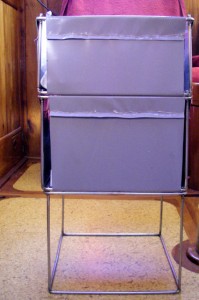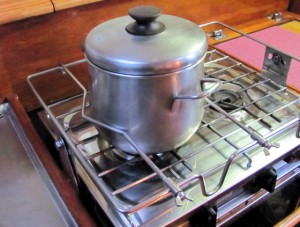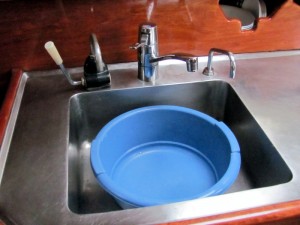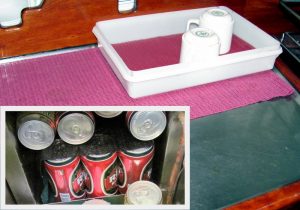Excerpts from Practical Boat Bits and Tips
![]()

Cruising Helmsman have been publishing a series of excerpts from Jude’s handy book, Practical Boat Bits and Tips, and we have put them online here. Of course there are many more ideas illustrated in her book, so if you want plenty of good ideas for making life afloat a lot easier, shout her a glass of wine for your own copy (PDF electronic format) or purchase a print copy here.
Practical boat tips – The Fridge
After living on board Banyandah for more than twenty years, we have definite ideas on how we want our refrigeration – simple and efficient! If you’re like us and like the freedom to be away from your boat for a few days and want an efficient, easily-managed fridge then here’s what works good for us.
First the fridge should not be too big, very well insulated and preferably top opening as cold sinks. Ours has a specially built U shaped eutectic plate driven by a 12 volt Danfoss compressor. This we manually control to minimize power usage and yet be able to add extra cold when motoring, or before leaving the boat unattended for up to six days and still save the veggies.
Practical boat tips – Stove Safety
Raising my children aboard a yacht from age two and three meant stove safety was critically important. Many times while Jack and I managed the ship the boys were left alone below, and because we have always used gas, the conveniently located shut off valve made it quick and easy to turn it off every time after using the stove. This no-hassle routine gave us peace of mind.
[Read More]
Practical boat tips –
Freshwater, Saltwater, and the Galley Sink
The galley sink on Banyandah is a good size measuring 380x340x150 mm deep with a centre drain. Into this I use a 310 mm round basin for washing up. This small basin minimizes freshwater use, and yet removing it, the sink is large enough to handle a banquet or clean the odd fish. When underway I find it very handy to drain the dishes in the sink around the basin.
Practical boat tips –
non-slip mats
Life aboard Banyandah would be difficult without non-slip mats lining the shelves, drawers, and bench tops. Rolls 30 cm wide can be bought cheaply from discount stores in a good range of colours and wider material is available at ship chandlers. It hand-washes well and dries quickly.
Practical boat tips –
Use old socks to protect on-board items
Old socks make good muffs. Simply cut the sock into two or three pieces depending on length of sock and stretch it over the bottle or drop bottle into the foot part. It is not necessary to have the sock full height of the glass, particularly with thick socks, as the thickness of the sock acts as a standoff. To save socks, alternate muffed bottles within a cupboard. I leave empty muffs in the cupboard ready for the next bottle.
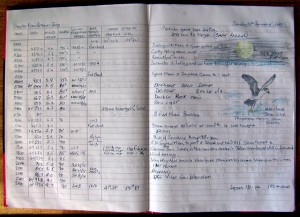
Banyandah’s Log Book
The Dinghy Painter
The dinghy painter should not be just any old rope nor even good quality nylon or braided polyester. It’s imperative to use floating rope for many reasons.[ More ]
Watch Keepers Safety Belt
When on night watch we always wear a watch keeper’s belt. Ours is made from wide webbing with good quality plastic buckles that clip shut securely and won’t burst open in a raging sea. On the belt, and attached to it are a high powered strobe, a pea-less whistle in its own little pocket and a PLB – personal location beacon. [ More ]
The Ships Log
We have always kept a log of our journeys on board Banyandah. When we first started sailing forty years ago we used store bought log books, but they proved rather expensive, so we designed our own page, photocopied it and put a bunch in a folder. We’re a little more clever today and now use lined A4 hardback notebooks obtained from most newsagents for about $5. I rule the columns myself. [ More ]

